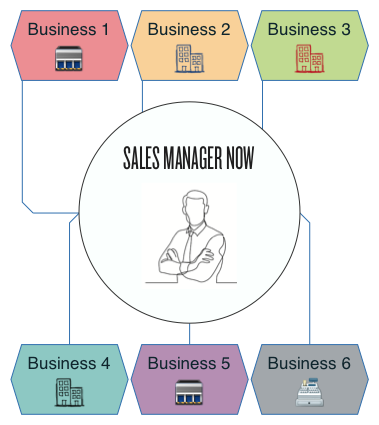Our firm began practicing fractional sales management in early 2006, and nearly 20 years later,…

Five Keys To Improve Your Sales Closing Ratio
To improve your sales closing ratio you need to focus on working smarter and harder. Once you have proven to yourself you can produce consistently at an acceptable level most good sales people want to sell more. Since sales is a numbers game, doing more of what you do now to make sales seems like a good formula for success. Unfortunately, sales is also a time game, and there is only so much of it in each day. There comes a time when you are maxed out and this is when working smarter and harder can come in handy.
Three ways to work smarter would be to find accounts that bring in more business for the time invested, have your existing accounts buy more frequently, and improve your closing ratio.
Here are five keys to improve your sales closing ratio.
1. Be more selective with who you approach
Evaluate your best customers or clients and create a profile called “My Ideal Client.” What are the most obvious characteristics that you could look for in new prospects? The more you drill down the closer you will be to creating focus. It can start with a vertical industry or business size, but consider things such as culture, decision makers personality or role, referred or not, if the company is strugging or succeeding as well. You need to find the common areas of your best clients so you can go look for more that match this profile. This profile has proven to be a key to success.
2. Be more diligent at qualifying
An early no is better than a late no. Remember you only have so much time in a day so spend it with the most qualified prospects. Quit simply bidding or quoting anyone that wants a price and start qualifying harder. Have they expressed their pain, problem, goal or objective to justify making a purchase? If no, walk away. Do they have the resources to purchase or are they simply shopping? Do they fit your ideal customer profile?
3. Slow down the b2b sales process
Once in a great whiile we run into a prospect that is ready to buy yesterday with check book in hand. The rest of the time they might say they are in a hurry but things usually slow down once it is time for a decision. Keep things moving but don’t let your fear of losing their interest or your hope for a quick close compromise your sales process. Be thourough with you discovery process. Taking short cuts will always come back to bite you.
4. Work a referral system
We all know referrals are our best prospects. I would also tell you that most sales people do not proactively help their customers or clients produce more referrals for them. Create a referral system. The link will take you to an article on referrals.
5. Go beyond the traditional selling process and become part of your prospects buying process/system/culture.
This last step is really the masters’ course in selling. It is not required to make some increase in your closing ratio, but for those who want to push their closing percentage up in the 75%+ range need to learn about this step. It is hard to explain but Sharon Drew Morgen in her book, “Dirty Little Secrets – Why buyers Can’t Buy and Seller Can’t Sell, and What YOU Can Do About It!”, spells it all out. In a nut shell it is taking off your selling hat and becoming a consultant who will ask questions that allow decision makers to explore the internal process that helps buying decisions move along and ones that slow or stop them in their tracks. It can be as simple as one person not wanting to deal with an attitude of another manager or employee that stops a smart business purchase from taking place.It is not all about business, as there are hidden interpersonal agendas that never are spoken of that kill many deals.
In any economy, the people that work smart and hard will prevail. Now get out of here and close some business:).




Comments (0)